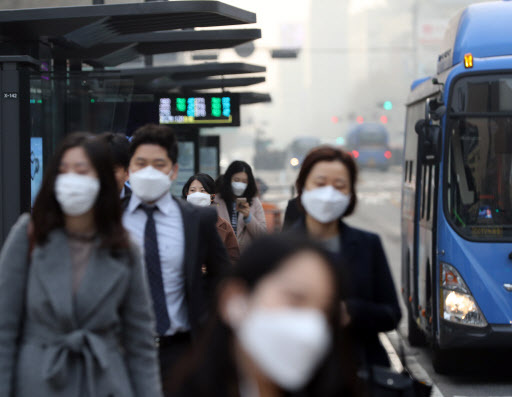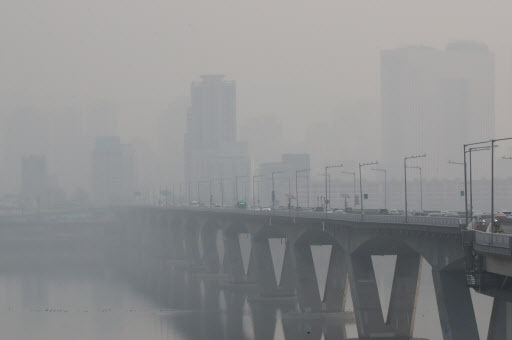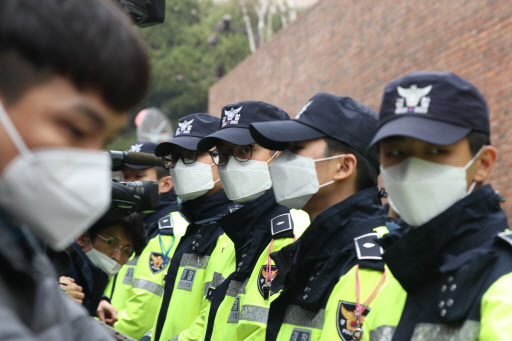[From the scene] Frustration grows in S. Korea over continued ultrafine dust
By Ock Hyun-juPublished : March 6, 2019 - 15:11
Frustration and anger are growing in Korea as high levels of ultrafine particulate pollution choked most parts of the country for more than a week.
On Wednesday, emergency measures to reduce ultrafine dust -- defined as dust consisting of particles smaller than 2.5 micrometers in diameter -- were enforced for the sixth consecutive day in Seoul and surrounding areas, prompting President Moon Jae-in to order his government to secure extra funds in the budget if necessary and consult with China to tackle pollution.
Checking the level of ultrafine dust particles for the day, wearing a mask when going outside and avoiding outdoor activities have become part of the daily routine for many amid the worsening air pollution.
“When I breathe these days, I feel like my life expectancy is declining every day,” said Jin Cho, a banker in her 40s, who was on her way back to work with a colleague after lunch near City Hall.
On Wednesday, emergency measures to reduce ultrafine dust -- defined as dust consisting of particles smaller than 2.5 micrometers in diameter -- were enforced for the sixth consecutive day in Seoul and surrounding areas, prompting President Moon Jae-in to order his government to secure extra funds in the budget if necessary and consult with China to tackle pollution.
Checking the level of ultrafine dust particles for the day, wearing a mask when going outside and avoiding outdoor activities have become part of the daily routine for many amid the worsening air pollution.
“When I breathe these days, I feel like my life expectancy is declining every day,” said Jin Cho, a banker in her 40s, who was on her way back to work with a colleague after lunch near City Hall.

“My eyes and my throat are sore. I bought a large number of masks and I don’t even make dinner plans these days due to the fine dust,” she said. “I am angry, annoyed and worried whether I am outdoors or indoors because of the pollution.”
The average hourly level of ultrafine dust, known as a class one carcinogen, was measured at 180 micrograms per cubic meter in Seoul, 176 in Gyeonggi Province, 155 in Incheon and 147 in Gangwon Province as of 1 p.m. Wednesday, with emergency measures in place in 14 cities.
Many people have questioned the effectiveness of government actions.
“What did the government measures change? Nothing,” Cho said. “The government should rather install air purifiers at bus stops, for example, if it wants to make a change we can feel in real life.”
Emergency measures were extended through Thursday in Seoul, Incheon and Gyeonggi Province.
Under the emergency measures, city and provincial governments can ban old diesel cars from streets and restrict the operations of coal power plants and other facilities that produce emissions. They can also recommend temporary closures or the reduction of class hours and ask businesses to allow their employees to work flexible hours or from home.

The toxic levels of pollution are even more frustrating for those whose jobs force them to work outdoors.
“I am so depressed these days,” said a police officer based in Yangju, Gyeonggi Province, who wished to remain anonymous. “When levels of fine dust are extremely high like in recent days, I am worried about my health. But it is my job to spend six to eight hours outside.”

“Isn’t China the biggest problem? What is the point of banning old diesel cars from the streets? The government is only scratching the surface,” he said.
Foreign visitors have appeared to be more vulnerable to the thick air pollution, with many not wearing masks.
“I received a fine dust alert in a text message, but that was all in Korean,” Fung Tze Shan, 32, from Singapore said near Gwanghwamun Square. “I am not exactly worried because we don’t stay here for long. But it is bad for sightseeing because the city looks gloomy. I didn’t wear a mask for pictures.”
Amid mounting public concerns over alarming levels of air pollution, Moon ordered his government Wednesday to discuss dust-reducing measures -- such as artificial rain aimed at clearing ultrafine particles in the air -- with China.
“China claims our dust flies to China’s Shanghai region, so making artificial rain over the Yellow Sea would help the Chinese side as well,” Moon said, according to Cheong Wa Dae spokesman Kim Eui-kyeom.
Moon also called for the permanent shutdown of aged coal power plants and the installation of air purifiers in more day care centers and schools, according to the spokesperson.
The government is closely working with China to fight particulate pollution and China has “strong willingness” to tackle air pollution, Environment Minister Cho Myung-rae said Wednesday in a meeting with media.
Seoul and Beijing have held a series of ministerial and working-level talks on a regular basis to boost cooperation in solving the fine dust problem in the region. The South Korea-China Environmental Cooperation Center opened in Beijing in June.
When the density of dust pollution is high on the Korean Peninsula, a large portion of the fine dust -- more than 70 percent of ultrafine pollutants over South Korea -- is believed to be coming from China, a Seoul-run environmental institute said in a briefing Wednesday.
“High density of ultrafine dust continued recently because weather conditions caused air over the Korean Peninsula to be stagnant and delayed diffusion of pollutants originating within the country and from abroad,” said Shin Yong-seung of the Research Institute of Public Health and Environment.
The lack of winds and the warm temperatures cause the air over the Korean Peninsula to be stagnant, a result of a “climate penalty,” Shin said, adding that measures to fight fine dust must take into account how to mitigate climate change.
The density of ultrafine dust in all areas here was forecast to temporarily go down Thursday before pollution again worsens over the weekend, according to the National Institute of Environmental Research.
Rival parties -- the ruling Democratic Party, the main opposition Liberty Korea Party and the minor opposition Bareunmirae Party -- held an emergency meeting Wednesday to initiate bipartisan efforts to tackle the fine dust pollution.
They agreed to pass fine dust-related bills through the parliament at the extraordinary session next Wednesday.
By Ock Hyun-ju (laeticia.ock@heraldcorp.com)
Foreign visitors have appeared to be more vulnerable to the thick air pollution, with many not wearing masks.
“I received a fine dust alert in a text message, but that was all in Korean,” Fung Tze Shan, 32, from Singapore said near Gwanghwamun Square. “I am not exactly worried because we don’t stay here for long. But it is bad for sightseeing because the city looks gloomy. I didn’t wear a mask for pictures.”
Amid mounting public concerns over alarming levels of air pollution, Moon ordered his government Wednesday to discuss dust-reducing measures -- such as artificial rain aimed at clearing ultrafine particles in the air -- with China.
“China claims our dust flies to China’s Shanghai region, so making artificial rain over the Yellow Sea would help the Chinese side as well,” Moon said, according to Cheong Wa Dae spokesman Kim Eui-kyeom.
Moon also called for the permanent shutdown of aged coal power plants and the installation of air purifiers in more day care centers and schools, according to the spokesperson.
The government is closely working with China to fight particulate pollution and China has “strong willingness” to tackle air pollution, Environment Minister Cho Myung-rae said Wednesday in a meeting with media.
Seoul and Beijing have held a series of ministerial and working-level talks on a regular basis to boost cooperation in solving the fine dust problem in the region. The South Korea-China Environmental Cooperation Center opened in Beijing in June.
When the density of dust pollution is high on the Korean Peninsula, a large portion of the fine dust -- more than 70 percent of ultrafine pollutants over South Korea -- is believed to be coming from China, a Seoul-run environmental institute said in a briefing Wednesday.
“High density of ultrafine dust continued recently because weather conditions caused air over the Korean Peninsula to be stagnant and delayed diffusion of pollutants originating within the country and from abroad,” said Shin Yong-seung of the Research Institute of Public Health and Environment.
The lack of winds and the warm temperatures cause the air over the Korean Peninsula to be stagnant, a result of a “climate penalty,” Shin said, adding that measures to fight fine dust must take into account how to mitigate climate change.
The density of ultrafine dust in all areas here was forecast to temporarily go down Thursday before pollution again worsens over the weekend, according to the National Institute of Environmental Research.
Rival parties -- the ruling Democratic Party, the main opposition Liberty Korea Party and the minor opposition Bareunmirae Party -- held an emergency meeting Wednesday to initiate bipartisan efforts to tackle the fine dust pollution.
They agreed to pass fine dust-related bills through the parliament at the extraordinary session next Wednesday.
By Ock Hyun-ju (laeticia.ock@heraldcorp.com)
-
Articles by Ock Hyun-ju







![[Graphic News] More Koreans say they plan long-distance trips this year](http://res.heraldm.com/phpwas/restmb_idxmake.php?idx=644&simg=/content/image/2024/04/17/20240417050828_0.gif&u=)
![[KH Explains] Hyundai's full hybrid edge to pay off amid slow transition to pure EVs](http://res.heraldm.com/phpwas/restmb_idxmake.php?idx=644&simg=/content/image/2024/04/18/20240418050645_0.jpg&u=20240419100350)






![[From the Scene] Monks, Buddhists hail return of remains of Buddhas](http://res.heraldm.com/phpwas/restmb_idxmake.php?idx=652&simg=/content/image/2024/04/19/20240419050617_0.jpg&u=20240419175937)

![[KH Explains] Hyundai's full hybrid edge to pay off amid slow transition to pure EVs](http://res.heraldm.com/phpwas/restmb_idxmake.php?idx=652&simg=/content/image/2024/04/18/20240418050645_0.jpg&u=20240419100350)

![[Today’s K-pop] Illit drops debut single remix](http://res.heraldm.com/phpwas/restmb_idxmake.php?idx=642&simg=/content/image/2024/04/19/20240419050612_0.jpg&u=)